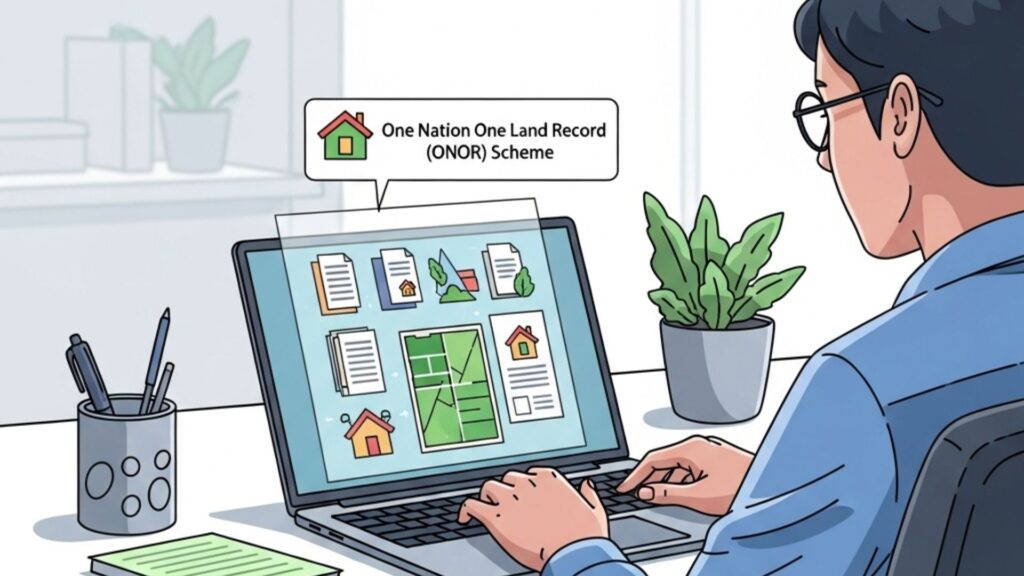Property transactions in India often require a great deal of checking and verification. Buyers want assurance that the land or property they are investing in is legally clear, and sellers want a smooth transfer without unnecessary delays. The One Nation One Land Record (ONOR) scheme is a government initiative that aims to simplify this process by creating a single, standardised system for land records across the country.

Table of Contents
Understanding the One Nation One Land Record Scheme
The ONOR scheme focuses on integrating and digitising land records in all states and union territories. Currently, each state follows its own method for maintaining records, with differences in formats, terminology, and procedures. This can make verification challenging, especially if a buyer is considering land in another state.
Under ONOR, the aim is to have a unified digital database where records are presented in a standard format. This would allow buyers, sellers, and authorities to check ownership details, transaction history, and legal status through one reliable source.
Why Land Record Transparency Matters
Land records are the backbone of any property transaction. Without proper documentation, buyers may face disputes, legal complications, or even loss of investment. Clear and accessible land records not only help in confirming ownership but also ensure that the property is free from encumbrances such as unpaid loans or pending court cases.
Key Benefits for Property Buyers
Easier Verification
A unified platform would allow buyers to check property details from anywhere, without navigating multiple state websites or visiting local offices.
Reduced Risk of Fraud
Digitised and updated records will reduce the chances of duplicate sales, forged documents, or disputes over ownership.
Faster Due Diligence
Since information will be accessible instantly, the time taken for verification during property purchase can be significantly reduced.
Confidence in Cross-State Investments
For buyers interested in properties outside their home state, the ONOR scheme could remove the barrier of unfamiliar local record systems.
How ONOR Could Transform Property Transactions
If the scheme is implemented successfully, it could bring about a more trustworthy and transparent real estate market. Buyers may feel more confident about investing in lesser-known regions. Sellers could also benefit from faster sales and reduced disputes.
Financial institutions might use the unified system to confirm ownership and assess property value more efficiently, helping speed up home loan approvals.
Role of Technology in One Nation One Land Record
Technology will play a central role in making ONOR work. The system will need:
- Digitisation of Records – Scanning and converting existing physical records into digital form.
- Data Standardisation – Aligning all states’ data into a single, uniform format.
- Integration with GIS Mapping – Linking land records to geographic maps for accurate location and boundary details.
- Online Accessibility – Providing a secure platform where anyone can access the records.
Link with Digital India Land Records Modernization Programme (DILRMP)
ONOR builds on the foundation laid by the DILRMP, which aims to digitise and modernise land records. While DILRMP focuses on improving records within individual states, ONOR seeks to connect them into one nationwide system.
Implementation Challenges
Although the scheme promises great benefits, several challenges need to be addressed:
- Data Accuracy – Old records may contain errors that must be corrected before integration.
- State Coordination – States must agree on a common format and process.
- Technology Readiness – Adequate infrastructure is required to handle and secure large amounts of data.
- Public Awareness – People need to know how to access and use the system effectively.
What Buyers Should Do in the Meantime
Since the One Nation One Land Record scheme is still in progress, buyers should continue following traditional due diligence steps:
- Visit the local land records office or use the state’s online portal.
- Verify ownership details, encumbrances, and transaction history.
- Cross-check survey numbers and property boundaries.
- Consult a legal expert before finalising the deal.
Once ONOR is active in your state, you will be able to use the unified portal for the same checks, likely with less effort.
Potential Impact on Real Estate Growth
Over time, the One Nation One Land Record scheme could contribute to a healthier property market. By making transactions more secure and straightforward, it could attract more investment into both urban and rural areas. Increased buyer confidence could also lead to higher demand, which might encourage more development projects.
Conclusion:
For property buyers, the ONOR scheme is a step toward a more transparent and accessible land market. While the process of bringing every state on board will take time, the long-term benefits could be significant. If implemented well, One Nation One Land Record could make buying property in India, whether in your hometown or hundreds of kilometres away, a more confident and straightforward experience.
Frequently Asked Questions
Q. Will the ONOR scheme replace state land record offices?
No. State land record offices will still operate, but their data will be connected to a centralised digital system under One Nation One Land Record. This means buyers can check details online while local offices continue handling in-person services.
Q. Can I update my property details directly in the ONOR system?
Updates will still need to be made through the local land record office or the state portal. ONOR will reflect changes once the state records are updated.
Q. Is there a cost for accessing land records under ONOR?
The government has not announced the exact fee structure. In many states, basic ownership details are free, while certified copies or detailed reports may have a small fee.
Q. Will One Nation One Land Record include agricultural land records as well?
Yes. The scheme aims to cover all categories of land, including agricultural, residential, and commercial properties.